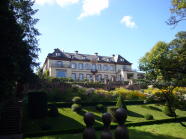General Outline of "Professions and Proficiency: The Rise and Demise of Knowledge"
The generation of new knowledge is fundamental to innovation. Studying the tangible imprints of such knowledge on products and services has been crucial to the appraisal of innovation for the global knowledge economy. Yet new products embody only part of new knowledge, which often leaves no tangible trace but exists enigmatically as proficiency of individuals and in the collective agency of professions and epistemic communities. Furthermore, the rise and demise of knowledge is situated in geographical context and evolves unequally between places and across space. While innovation research has focused predominantly on tangible innovations in products and technologies, the innovation of such intangibles as new ideas, designs, business models, and services seems to have received somewhat less research attention. This 18th symposium invites scholars from various fields of research to consider the roles of professions and proficiency in the innovation of intangible concepts. It offers a platform for conversation on theoretical topics, methodological contributions, and empirical research regarding the following issues:
- Profession and proficiency. The intangible, contextual nature of knowledge raises questions about how individuals become proficient in a particular field and how that proficiency crystalizes into a profession. In a society in which more and more people are choosing to pursue proficiency outside formal training, how do professions evolve and effectively transmit field-specific knowledge? What roles do place and space play in the way that professions evolve and innovate?
- Service innovation. Technological innovation research has been largely disconnected from that of service innovation. This raises the question of how individual proficiency facilitates the conceptualization of new ideas and services in professions. What are the processes of innovation in business models, designs, organizational routines, and professions such as financial, accounting or legal services, etc.? How can service innovations be identified and measured, and what is their role in industrial and technological innovation?
- Professions and the demise of knowledge. A disparity presently exists between formal education and the actual skills and expertise necessary for integration into the labor market. Given the importance of closing this gap, how can highly specialized and often ephemeral expertise be codified into formal training schedules? How can history help understand the demise of knowledge and the loss of proficiencies such as specialized skills in traditional crafts. How do practices of secrecy as well as dynamics of relational turnover affect the unlearning of intangibles?





